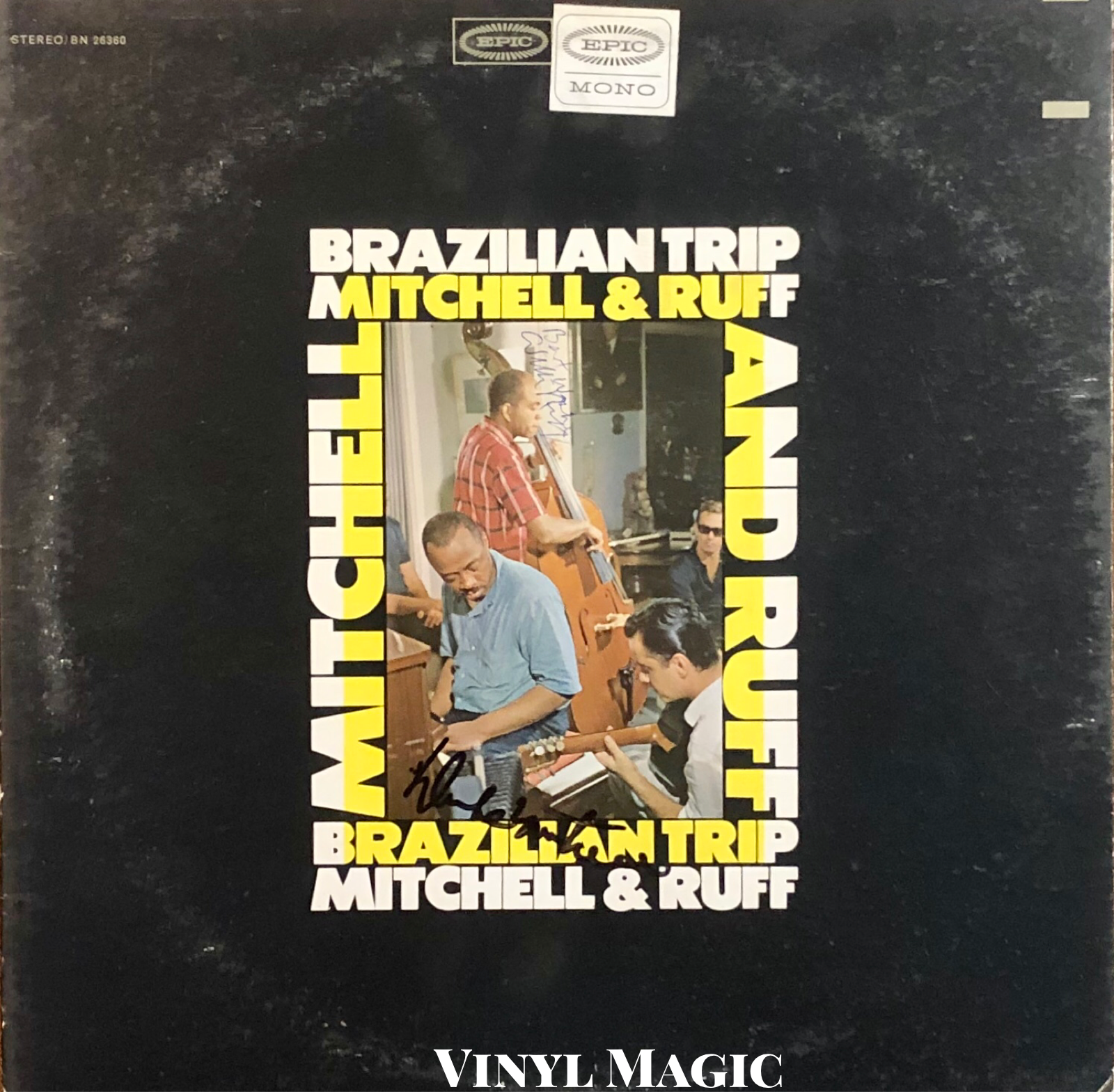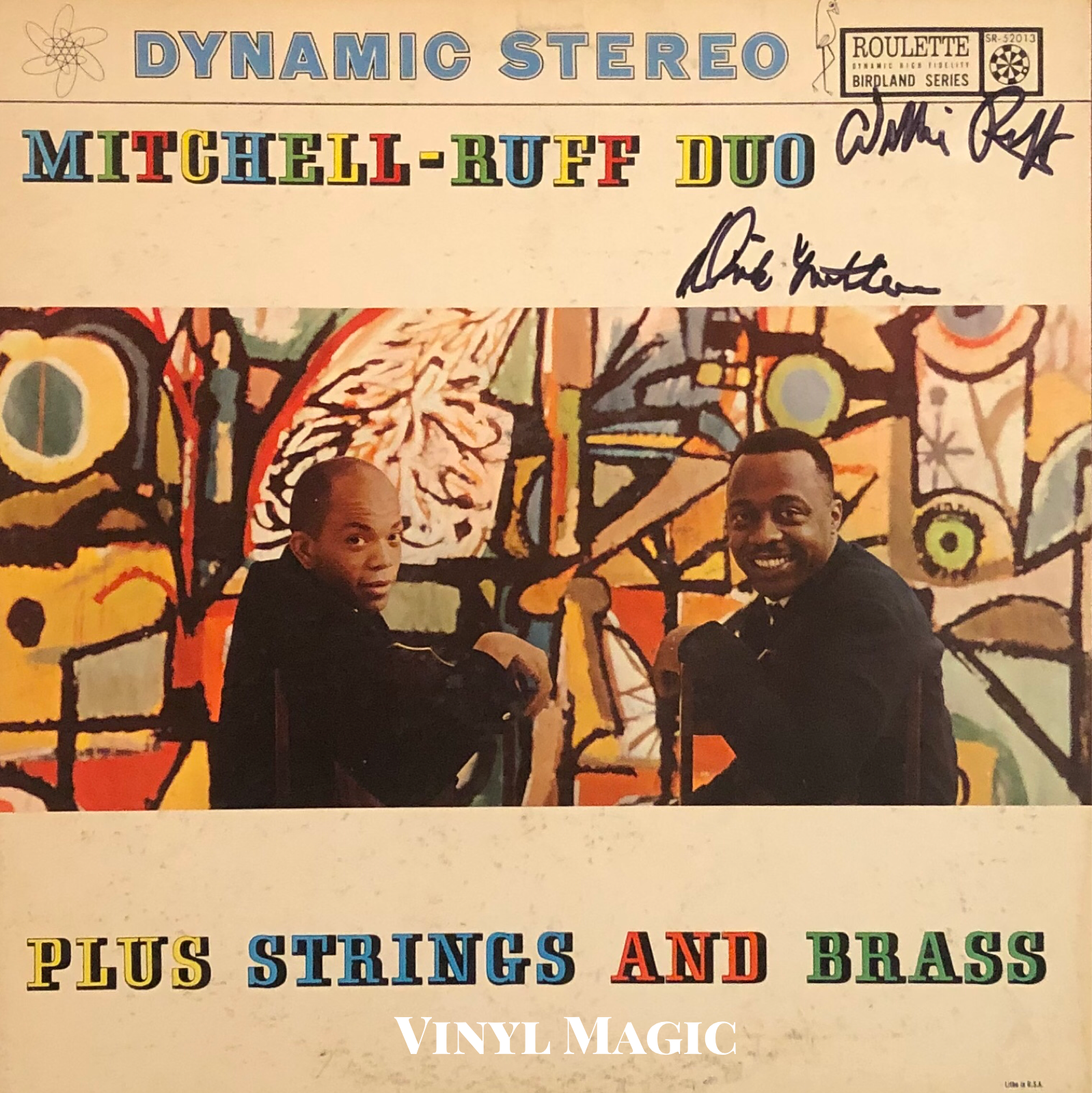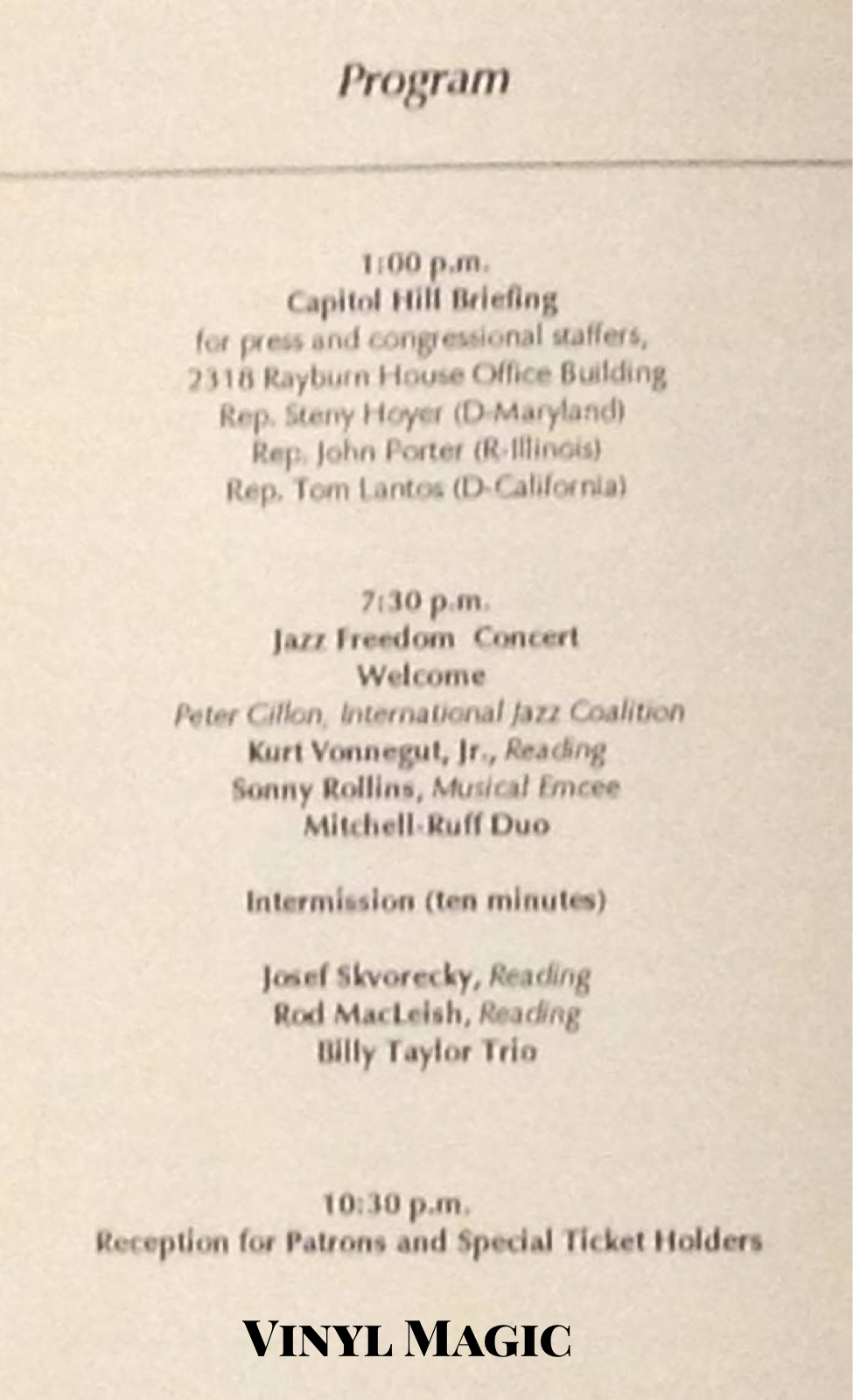Mitchell-Ruff and Me...
I learned long ago that it does no good to complain about the piano. Once you start complaining, you’re throwing yourself into another state. You think, ‘This damn piano,’ and you get mad at it, and when you get angry, you play angry and you can’t project who you really are, because you’ve been transformed into an angry person and all kinds of things are going through your mind. Instead you say, ‘What does it do? Will it do anything? Let’s check it out.’ You try to work with it, and sometimes it’s a lot of fun, because many pianos give you a different response from the one you’re used to, and that makes you play differently.
Dwike Mitchell
After This Message (1966) signed by Mitchell Ruff
I write this years later, remembering it as if I had just stepped out of Strayhorn's apartment or slipped into the wings at Lincoln Center, with Ellington's voice shivering me in the heart. It was indeed a landmark, a transition for a still young artist who had come from what seemed like nowhere, had arrived somewhere, and was going he knew not where. The one thing I do know about that magical evening—about the totality of that experience with those creators and ambassadors of the music that was born and bred nowhere else but in America—is that it seemed to me a calling: a "call to assembly" was the phrase they used when I was a young army private. I knew I was on notice, and I had to heed the call.
A Call To Assembly (1991) by Willie Ruff
Appearing Nightly (1957) signed by Mitchell Ruff
Dwike Mitchell and Willie Ruff formed the Mitchell Ruff Duo in 1955 after playing rhythm in the Lionel Hampton orchestra in the early 1950s. They were small town Southern boys, Dwike from Alabama, Willie from Florida, who met in the US Army in 1947 and bonded over their passion and love of music. Mitchell Ruff became an acclaimed jazz duo and they were the first jazz band to play in the Soviet Union in 1959, playing at conservatories in Leningrad, Kiev and Moscow, and in China at conservatories in Peking and Shanghai in 1981. They were wildly received and celebrated.
They were an unlikely pairing. Willie Ruff is as outgoing and effusive as Dwike Mitchell is shy and reclusive. Both are classically trained virtuoso musicians, Dwike the florid pianist with tremendous technique, Willie the kinetic upright bassist and purveyor of exquisite French Horn. Mitchell Ruff opened for all the major bands in the 1950s, including Louis Armstrong, Duke Ellington, Count Basie and Dizzy Gillespie, and they released some glorious recordings.
Dwike Mitchell is simply the greatest jazz pianist that most people have never heard. Don't take my word, ask Duke Ellington or Billy Strayhorn. Strayhorn was Duke's arranger, right hand man for nearly thirty years and the brilliant composer of "Chelsea Bridge", "Lush Life", and the Ellington theme, "Take The A Train." Billy and the Duke had become staunch fans of Mitchell Ruff and would see them perform regularly at the Hickory House in New York City. As Strayhorn was dying of cancer, he wrote a piece for Mitchell Ruff, "Suite For Piano And Horn", which appears on Strayhorn: A Mitchell Ruff Interpretation (1972) and features other classic Strayhorn songs. This is one of the few compositions Billy wrote for anyone other than Duke Ellington. When Billy died in 1968, Ellington curated and stage managed his memorial (which established a scholarship at Julliard), and Mitchell Ruff played "Suite For Piano And Horn." As Duke told Ruff when they finished, "Strayhorn smiled tonight." Fitting praise and an august honor from the highest music royalty.
Strayhorn: A Mitchell Ruff Interpretation (1972) signed by Mitchell Ruff
In 1971, Willie Ruff joined the Yale School Of Music and he has had an esteemed career in academia, culminating in receiving Yale's highest award in 2013, The Sanford Medal. As a result of Willie's academic responsibilities, Mitchell Ruff club performances were rare. Erin and I were lucky to see them twice, once at the Duke Ellington School Of The Arts in Washington, DC for a Jazz Freedom Concert in 1987, and at the Yale Summer School Of Music in Norfolk, Connecticut in 2003. Two very memorable performances.
The Jazz Freedom Concert was a fundraiser to create awareness for the plight of Czechoslovakia's Jazz Section, jazz enthusiasts who promoted jazz through magazines and concerts since the 1968 Soviet Union invasion.This organization was abolished in 1984 (with an apparent nod to George Orwell) and two of its leaders were given 16 month prison sentences in 1987 for "illegal economic activities." Sonny Rollins (sans saxophone) served as MC, author Kurt Vonnegut and noted Czech author Josef Skvorecky gave readings, and the Mitchell Ruff Duo and The Billy Taylor Trio delivered sparkling sets. The concert was broadcast live over Voice Of America to Eastern Bloc countries. Perhaps it really wasn't President Reagan imploring, "Mr. Gorbachev, tear down this wall" that caused the Cold War to end...
Brazilian Trip (1966) signed by Mitchell Ruff
After the concert, there was a small reception for the artists. I made a beeline to Willie Ruff with some albums. I told him Brazilian Trip (1966) was one of my favorites. He laughed, "Tanto Canto, that's a great song." I agreed, it is the first song and it has a beautiful and intricate French Horn solo. Brazilian Trip is brilliant and it is my favorite bossa nova jazz album by far. Stan Getz and Charlie Byrd's Jazz Samba (1962) is close, and there are some great recordings by Jobim, Gilberto, and Bonfa, but this virtually unknown album, recorded in Brazil with some (then) unheralded performers and their original compositions is stunningly beautiful. Its neglect is criminal. I asked Willie when he was finished signing where Dwike was. "Oh Dwike's already left. He doesn't really do these things."
Plus Strings And Brass (1958) signed by Mitchell Ruff
Sixteen years later, we saw Mitchell Ruff perform at the Music Shed on the beautiful Stoeckel estate in Norfolk, Connecticut. This estate was bequeathed in 1939 to Yale University by Ellen Battell Stoeckel, the daughter of wealthy industrialist and philanthropist, Robbins Battell. The Music Shed was built in 1906, seats 1500, and is constructed with cedar and redwood imported from California (apparently you could cut down Redwood trees in the early 1900s). As beautiful as it is, the Music Shed acoustics are equally extraordinary, and many artists have performed on this stage throughout its illustrious history including Enrico Caruso, Sergei Rachmaninoff, Jean Sibelius and Dave Brubeck.
The Mitchell Ruff show was exceptional. Willie, a gifted speaker and educator, introduced each song and gave some needed back story. Dwike Mitchell did all his talking through his playing. They played "Autumn Leaves", Willie dropping the bottom with a beautiful bass solo introduction and setting the groove, then Dwike coming in with quicksilver runs on this familiar melody, darting in and out, his phrasing alternately loud and delicate. I never saw Art Tatum, but I have seen Dave Brubeck, Oscar Peterson, Hank Jones, Chucho Valdes, Brad Mehldau and so many others. No one comes close to Dwike's piano artistry. No one.
They played the blues - "The Catbird Seat", a filthy funk redolent of a 4am vibe, standards - a rollicking "They Can't Take That Away From Me" from the Gershwin catalog, and classical - Stravinsky's "Firebird Suite" complete with Ruff's extended French Horn solo and introduction, followed by the magnificent comping of Dwike Mitchell. And don't get me started on their sublime version of Brahms "Lullaby"... It was a thorough and complete musical education in ninety minutes.
The Catbird Seat (1961) signed by Mitchell Ruff
After the show, I headed backstage. Willie was holding court, surrounded by many well wishers. I looked around for Dwike. No sign of him. I asked Willie. "Oh, he's back there, hiding out." I was determined not to lose my quarry again so I went back-backstage. There was Dwike by himself. I thanked him for his performance and especially his remarkable piano prowess. I told him how beautiful and meaningful his music is. He signed the albums, thanked me and I left.
Mitchell Ruff performed for nearly 60 years together (until Dwike passed in 2013), as Willie noted, "the oldest continuous group in jazz without personnel changes." They were ambassadors and statesman who traveled the world delivering beautiful music to educate and enrich the lives of so many.
They definitely enrich mine.
Dizzy Gillespie Live (1981) signed by Mitchell Ruff
Jazz Freedom Concert (1987) signed by Kurt Vonnegut
Jazz Freedom Concert (1987) program insert
choice Mitchell-Ruff Cuts (per BK)
https://www.youtube.com/watch?v=aU2i4Hk57c8
"The Catbird Seat" recorded live in New Haven CT 1961
https://www.youtube.com/watch?v=stMhIeHHIiU
"Autumn Leaves" After This Message 1965
https://www.youtube.com/watch?v=CSX2-vtkEUM
"Tanto Canto" Brazilian Trip 1966
https://www.youtube.com/watch?v=pS7WDCcL6-Q
"Nao Deixa" Brazilian Trip 1966
https://www.youtube.com/watch?v=BYkD2KwNO3k
"Sem Mais Chorar" Brazilian Trip 1966
https://www.youtube.com/watch?v=otcIZGtZ2w0
"Firebird" Breaking The Silence 2009
https://www.youtube.com/watch?v=WxSeU9NcXtg
"Take The A Train" Strayhorn: A Mitchell-Ruff Interpretation 1971
https://www.youtube.com/watch?v=fmpympipB98&list=PLKvJuExD_6vxVJ_87HdgyKLVxKCCE92ke
"Con Alma" Dizzy Gillespie with Mitchell Ruff at Dartmouth . 1971
https://www.youtube.com/watch?v=dJNo8haXWS4
"Deixa Pra La" Brazilian Trip 1966
Dwike Mitchell and Willie Ruff at Duke Ellington School of Arts, Washington DC 1987 photo by me









